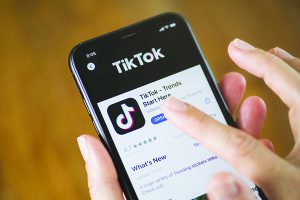TikTok is a happy place. From cute kitties to lip-syncing stars, the Chinese short-video service is a place where people go to entertain and to be delighted. Unlike Twitter and Facebook, the site is abjectly apolitical. Yet, politicians increasingly find it quite objectionable.
This is not dichotomous.
What makes TikTok so harmonious is also the very thing that attracts suspicion and ever-louder calls for the social-media platform to be banned in the US: the data it collects and the algorithms that power it. The vast troves of material TikTok gathers on users is what has regulators and legislators most aghast. Yet the secretive process by which videos are sorted and surfaced requires this mountain of information to function. One cannot exist without the other, and combined they create a powerful entertainment channel that’s compelling and addictive.
Algorithm is just a fancy word for formula or recipe. It’s like an algebraic function, with the final result derived from a combination of the inputs and the underlying equation itself. At TikTok, that answer is short-form videos which are “exciting, spontaneous and genuine.†The company offers a simple promise that the content is “guaranteed to make your day.â€
But whereas the marquee products from Twitter Inc. and Meta Platforms Inc. have become places that disparate groups meet and clash, TikTok is designed to keep opposing views apart. That’s actually a pretty good trait. Twitter benefits from being the “public town square,†as new owner Elon Musk calls it, yet not being a place of debate is a key reason why TikTok has surpassed it in usage.
People who come to watch cat videos and magic broom rides aren’t likely to see rants against the pro-gun lobby. With Twitter and Facebook, lighted-hearted fare often mixes with dystopian warnings. They’re rancorous, messy and sometimes toxic. On Instagram, another of Meta’s properties, myths about beauty and body image cause documented harm to teenage girls. Over at YouTube, owned by Alphabet Inc., damaging content gets served up to people on topics they hadn’t even sought.
At Twitter, the top ranks of popular posts are filled with politicians (Barack Obama, Joe Biden), Musk, and a facetious tweet about leaving this planet at a particularly tumultuous point in time. By contrast, TikTok’s hit list includes 10 seconds of head bobbing, a dude dancing to Nelly Furtado, and Khaby Lame peeling a banana.
This cheerful diet is not entirely organic.
TikTok deliberately tones down political posts, especially as it pertains to China. One of the most famous cases includes a 2019 ban of a US teenager after she criticized Beijing’s treatment of Muslim Uyghurs. The company said at the time that the account in question was not moderated due to China-related content, but because of a supposed association with a separate account that at one point featured an image of Osama Bin Laden. Yet a senior executive later admitted that posts related to the “Uyghur situation†had been censored. A TikTok search on “Uyghur Genocide†now shows multiple videos, with genocide denial filling the top three slots.
 The Gulf Time Newspaper One of the finest business newspapers in the UAE brought to you by our professional writers and editors.
The Gulf Time Newspaper One of the finest business newspapers in the UAE brought to you by our professional writers and editors.
